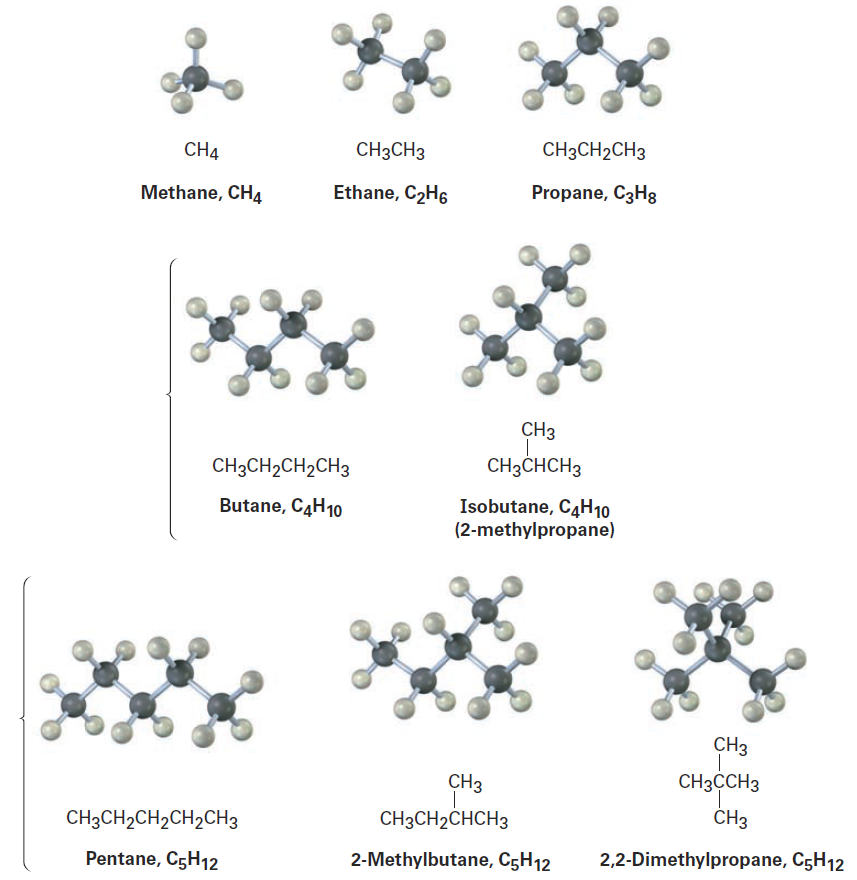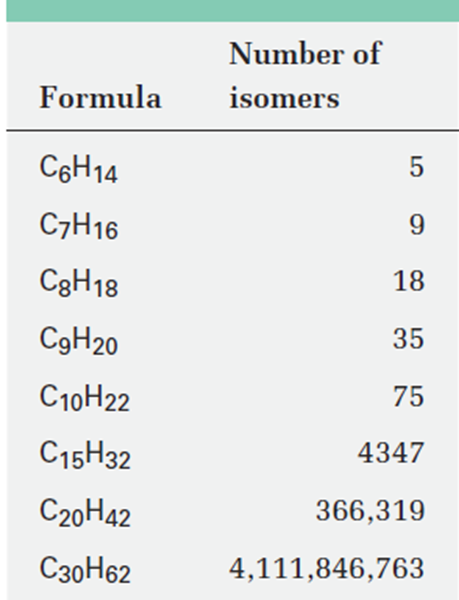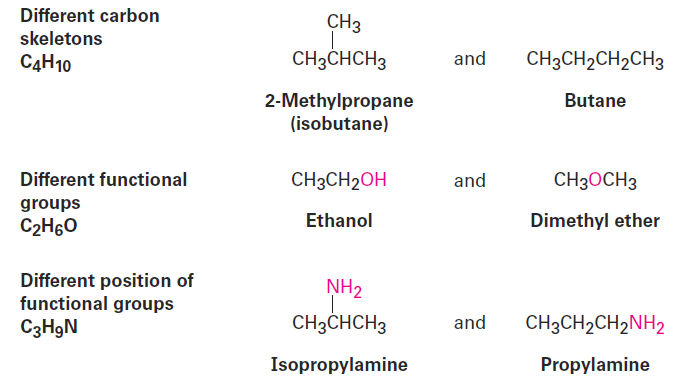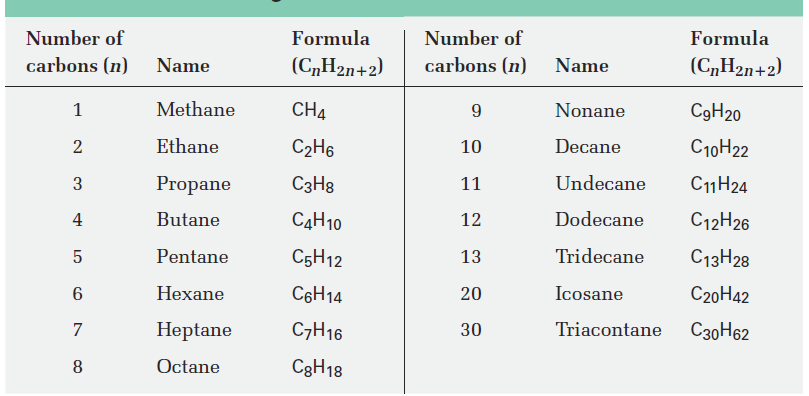


 علم الكيمياء
علم الكيمياء 
 الكيمياء التحليلية
الكيمياء التحليلية 
 الكيمياء الحياتية
الكيمياء الحياتية 
 الكيمياء العضوية
الكيمياء العضوية 
 الكيمياء الفيزيائية
الكيمياء الفيزيائية
 الكيمياء اللاعضوية
الكيمياء اللاعضوية 
 مواضيع اخرى في الكيمياء
مواضيع اخرى في الكيمياء
 الكيمياء الصناعية
الكيمياء الصناعية |
Read More
Date: 21-8-2016
Date: 28-8-2018
Date: 12-5-2016
|
Alkanes and Alkane Isomers
Before beginning a systematic study of the different functional groups, let’s look first at the simplest family of molecules—the alkanes—to develop some general ideas that apply to all families. We see that the carbon–carbon single bond in ethane results from s (head-on) overlap of carbon sp3 hybrid orbitals. If we imagine joining three, four, five, or even more carbon atoms by C–C single bonds, we can generate the large family of molecules called alkanes.

Alkanes are often described as saturated hydrocarbons: hydrocarbons because they contain only carbon and hydrogen; saturated because they have only C–C and C–H single bonds and thus contain the maximum possible number of hydrogens per carbon. They have the general formula CnH2n+2, where n is an integer. Alkanes are also occasionally called aliphatic compounds, a name derived from the Greek aleiphas, meaning that many animal fats contain long carbon chains similar to alkanes.

Think about the ways that carbon and hydrogen might combine to make alkanes. With one carbon and four hydrogens, only one structure is possible: methane, CH4. Similarly, there is only one combination of two carbons with six hydrogens (ethane, CH3CH3) and only one combination of three carbons with eight hydrogens (propane, CH3CH2CH3). When larger numbers of carbons and hydrogens combine, however, more than one structure is possible. For example, there are two substances with the formula C4H10: the four carbons can all be in a row (butane), or they can branch (isobutane). Similarly, there are three C5H12 molecules, and so on for larger alkanes.

Compounds like butane and pentane, whose carbons are all connected in a row, are called straight-chain alkanes, or normal alkanes. Compounds like 2-methylpropane (isobutane), 2-methylbutane, and 2,2-dimethylpropane, whose carbon chains branch, are called branched-chain alkanes. Compounds like the two C4H10 molecules and the three C5H12 molecules, which have the same formula but different structures, are called isomers, from the Greek isos 1 meros, meaning “made of the same parts.” Isomers are compounds that have the same numbers and kinds of atoms but differ in the way the atoms are arranged. Compounds like butane and isobutane, whose atoms are connected differently, are called constitutional isomers. We’ll see shortly that other kinds of isomers are also possible, even among compounds whose atoms are connected in the same order. As Table 1 shows, the number of possible alkane isomers increases dramatically with the number of carbon atoms. Constitutional isomerism is not limited to alkanes—it occurs widely throughout organic chemistry. Constitutional isomers may have different carbon skeletons (as in isobutane and butane), different functional groups (as in ethanol and dimethyl ether), or different locations of a functional group along the chain (as in isopropylamine and propylamine).
Table 1 :Number of Alkane Isomers

Regardless of the reason for the isomerism, constitutional isomers are always different compounds with different properties but with the same formula.

A given alkane can be drawn in many ways. For example, the straightchain, four-carbon alkane called butane can be represented by any of the structures shown as below .

These structures don’t imply any particular three-dimensional geometry for butane; they indicate only the connections among atoms. In practice, chemists rarely draw all the bonds in a molecule and usually refer to butane by the condensed structure, CH3CH2CH2CH3 or CH3(CH2)2CH3. Still more simply, butane can be represented as n-C4H10, where n denotes normal (straight-chain) butane.
Straight-chain alkanes are named according to the number of carbon atoms they contain, as shown in Table 2. With the exception of the first four compounds—methane, ethane, propane, and butane—whose names have historical roots, the alkanes are named based on Greek numbers. The suffix -ane is added to the end of each name to indicate that the molecule identified is an alkane. Thus, pentane is the five-carbon alkane, hexane is the sixcarbon alkane, and so on. We’ll soon see that these alkane names form the basis for naming all other organic compounds, so at least the first ten should be memorized.
Table 2: Names of Straight-Chain Alkanes




|
|
|
|
دخلت غرفة فنسيت ماذا تريد من داخلها.. خبير يفسر الحالة
|
|
|
|
|
|
|
ثورة طبية.. ابتكار أصغر جهاز لتنظيم ضربات القلب في العالم
|
|
|
|
|
|
|
العتبة العباسية المقدسة تستعد لإطلاق الحفل المركزي لتخرج طلبة الجامعات العراقية
|
|
|